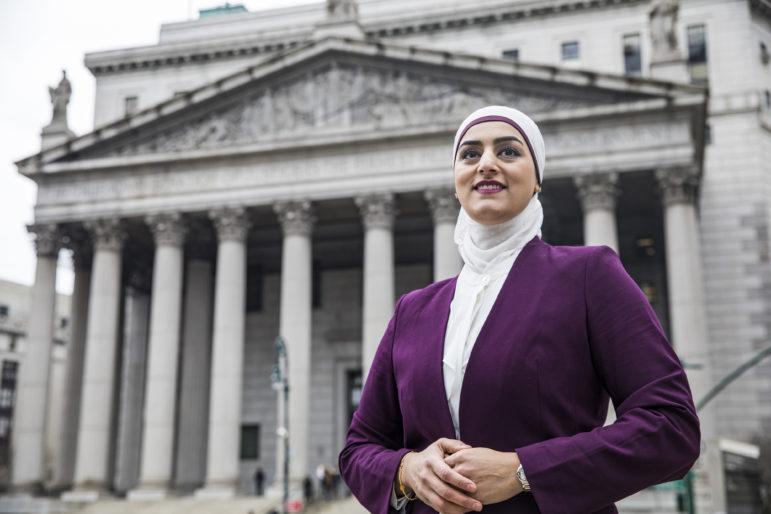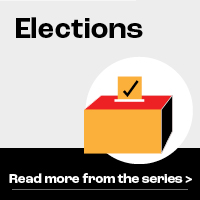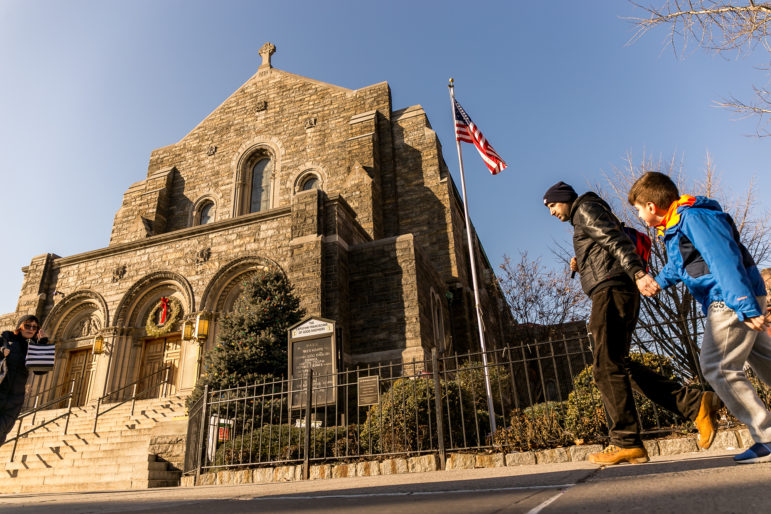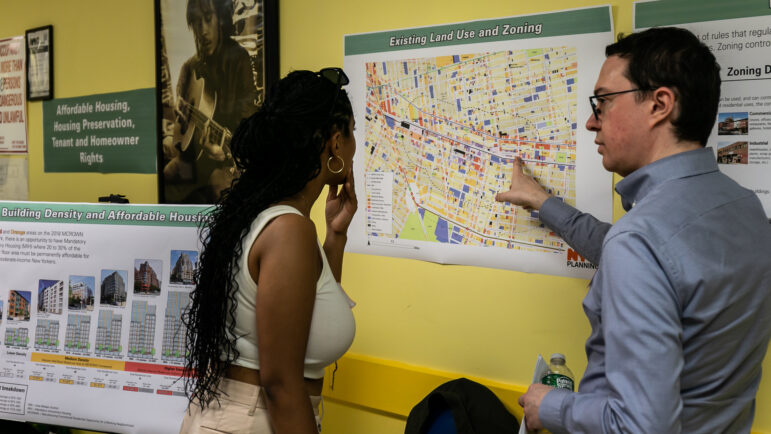Tahanie Aboushi is calling for independent investigations, more disclosure and a skeptical eye toward allegations of resisting arrest or assaulting a police officer.

Aboushi for DA
Tahanie Aboushi is one of a few DA candidates to outline a detailed police accountability policy. Her proposals go farther than others when it comes to dealing with cops who aren’t credible, officers who claim to have been assaulted and prosecutors who do wrong.In the opening sequence of the iconic television show that made the Manhattan district attorney’s office the most prominent part of America’s criminal justice system, viewers are told that, “in the criminal justice system, the people are represented by two separate yet equally important groups: The police, who investigate crime, and the district attorneys, who prosecute the offenders.”
Years of exposes, protest and reform have challenged the premises of that statement. The cops who stopped and frisked hundreds of thousands of innocent—and overwhelmingly Black or Latino—people were for the most part not investigating crimes. The district attorneys who put the Central Park Five or other wrongfully convicted people behind bars were prosecuting the innocent, not the guilty. There is growing support for redefining what police and prosecutors do.
The campaign for Manhattan district attorney is on trend, with many candidates talking about refusing to prosecute certain crimes or seeking to avoid incarceration for offenses they do pursue. Given the nature of the DA’s job, which Law & Order correctly pegged as operating in partnership with the police, candidates are also outlining how they plan to manage—and in some cases dramatically change—that relationship.
This week Tahanie Aboushi, a private defense lawyer and one of at least eight people in the current DA field, released her police and prosecutor accountability plan. She was not the first candidate to broach the topic, or address it in detail, but she might be proposing the most dramatic break from the past. Among her ideas is establishing a sort-of internal affairs unit to monitor wrongdoing by the DA’s own staff and determining whether people charged with assaulting police officers were acting in self-defense.
“We can never improve public trust in our justice system if we do not apply the law equally to all who violate it,” Aboushi writes in a campaign brief released Tuesday. “For too long, police officers have avoided accountability for their unlawful acts. We will bring that shameful pattern to an end.”
Common cause, particular prescriptions
The race for Manhattan district attorney has been underway for months, even as the incumbent, Cyrus Vance Jr., has been mum about whether he plans to run for re-election or step down. The general election is in November but the Democratic primary, which will most likely decide the race, is in June.
Just about everyone in the race has articulated an agenda for reforming policing. Tali Farhadian Weinstein has committed to “investigating thoroughly claims of police misconduct, following the evidence wherever it leads and holding law enforcement officers accountable when they offend – from false statements and perjury to serious acts of violence and excessive use of force,” as well as transparency around police misconduct. She’s also called for “evidence-based policies and legislation for police reform, and … scaling up community-based alternatives to policing wherever possible.”
Eliza Orlins’ platform “will shift the office’s focus from mass prosecutions of low-level non-violent crimes to focus on the real perpetrators of harm that make communities less safe and stable: violent crimes and abuses of power like police brutality and wage theft.” Dan Quart promises that he “will not be deferential to police unions or the NYPD,” and “will publicly disclose the names of police officers I do not find trustworthy” and “prosecute officers who break the law.” Liz Crotty says she will “institute a hotline for people to file complaints of police misconduct without fear of retaliation.”
A few candidates have offered more detailed plans.
Like Aboushi, candidates Alvin Bragg and Diana Florence have called for the establishment of a dedicated unit within the DA office to conduct investigations of police misconduct, and for more transparency around those findings.
Aboushi specifies that her Police Accountability Unit will focus on cases that the state Attorney General—which has special authority in cases of police killings—does not address. She promises quarterly reports on those investigations.
Florence’s campaign material indicates that her unit will work in conjunction with the Civilian Complaint Review Board. She also vows that in cases where cops are not charged, she will move for “public disclosure of grand jury minutes where a grand jury fails to indict a police officer on the top charge or publication of a grand jury report detailing wrongdoing or recommending policy changes.” Bragg has committed to issuing a public report “outlining investigative findings and legal conclusions and making recommendations for systemic reforms.”
Lucy Lang says she will also release a “detailed report” when grand juries decline to charge cops. She also vows to “take a proactive role in improving NYPD training and policy to be in line with the office’s moral and ethical standards and justice system philosophy” and “closely monitor police actions and intervene where there is a high-risk for police misconduct.”
On cop lies & prosecutorial wrongs
Aboushi, like Florence and Lang, makes specific promises about how the DA’s office should handle cases involving cops found to have lied.
Florence says if a cop lies, her office “will not pursue cases resting solely on that officer’s credibility, past cases resting solely on that officer’s credibility will be reviewed, and the police department and other local and federal prosecutors will be notified.” Lang’s policy is to “build upon the office’s mechanism for identifying officers with whom prosecutors should not work because of credibility issues.”
Aboushi says the Police Accountability Unit’s work will include “reviewing and handling prior cases of unreliable officers for conviction integrity issues, possible wrongful convictions, and sentence review.” Her campaign tells City Limits it cannot estimate how many cases it might need to review. “The data is so opaque that it’s hard to give a solid number, but we firmly believe the number could be very substantial – possibly thousands of cases over the past few decades,” a spokesperson wrote. “The review would include misdemeanors and violations because the purpose of the justice system is undermined when injustice is perpetuated at any level.”
Aboushi appears to be unique in making a separate proposal for an independent Prosecutor Accountability Unit that “will work with local Court Watch programs, public defenders and internal office units to ensure compliance from prosecutors with internal policy.” Like others in the race, Aboushi promises more disclosure of evidence to defendants and their lawyers.
She also places more emphasis on data, promising that her office will track comprehensive data for every arrest, analyze those stats and report the results every quarter “to a committee composed of stakeholder community organizations, public defenders, civil rights attorneys and office members including at least myself, my Chief Assistant, and the Chief of the Police Accountability Unit.”
“The committee will then recommend action the office will take, such as refusing to prosecute a certain type of case if it is linked to troubling patterns, placing an officer on a do-not call list, or recommending an officer for administrative or criminal investigation,” Aboushi vows.
There’s a whole section in Aboushi’s policy paper about the do-not-call list. “Placement on the do-not-call list means that the officer will not be called as a witness by the DANY in any court proceeding and the DANY will not rely on any evidence obtained by that witness absent sufficient independent corroboration.”
Assault on an officer or “self-defense”
Aboushi also promises to devote extra scrutiny to cases “where a law enforcement officer alleges to be the victim of a crime related to on-the-job conduct, such as an assault on a police officer.”
“If the unit finds there is credible evidence to prove the allegations beyond a reasonable doubt and that the officer’s conduct did not instigate or create the situation, the case will be handled in the regular course of business by a different unit,” her new platform reads. “If the unit determines that the evidence is insufficient, the office will decline the charge.”
Asked to clarify what it might mean for an officer to “instigate” an episode in which he or she was assaulted, Aboushi’s campaign replied:
We have to carefully evaluate these claims because, over the years, police officers have falsely claimed to be the victims of assault, even when there is clearly more to the story. For these situations, we must remember that the term “victim” also includes the victims in the receiving end of police violence. These are the victims whose voices have been silenced for decades under a system that was made to protect officers over our communities. We must ensure that we don’t provide any special treatment for the officers in these situations and we must not allow their word to carry more weight than that of the other party.We must also look at these claims on a case-by-case basis. If there are patterns that show an officer has a long record of these kinds of claims, we have to investigate to ensure the officer is not abusing their power. If an officer is found to unnecessarily be instigating a dangerous situation, they should not be serving as a police officer. The process also needs to distinguish between assault on an officer and the accused acting in self-defense in a physical situation instigated by the officer. That distinction is standard in all other assault investigations; the same should hold true here.
Among the other candidates, Lang also calls for more scrutiny “before bringing charges that are frequently seen in police misconduct cases (e.g. assaulting an officer, resisting arrest).” Lang says she will require ADAs to review body-worn camera video in such cases.
A campaign, not a consensus
The DA’s race is on the same timetable as the 2021 contests for mayor, Council and other municipal offices, but there are key differences: Since DA is not a city office, there are no public matching funds or spending limits. There is also neither ranked-choice voting nor any runoff provision: Whoever get the most votes wins the race, even if they end up well shy of a majority.
Given the current field of eight candidates, that means someone could become the next Manhattan DA with a fairly small share of the vote. Since almost all the candidates embrace reform, it is likely that the results of the race will endorse aggressive changes to the way prosecutors do their jobs, but it is not clear that the winning candidate will be able to claim consensus around the unique elements of her or his platform.
Being the chief prosecutor in a borough of 1.6 million people—a place that would be the sixth-largest city in the U.S. if independent—is a job of enormous power. But with a roster dwarfed by the 35,000-member NYPD, and a duty that, in the end, is chiefly concerned with enforcing the law as it stands, there are limits even to the DA’s influence over crime, policing and punishment in Manhattan.
Aboushi’s accountability platform seems to recognize this. “[T]ruly meaningful changes to policing must be done through community-based processes, in conjunction with comprehensive divestment from policing and investment in communities, as well as through elected civilian review with teeth,” the campaign brief reads. “The District Attorney can facilitate change and accountability through internal reform and through collaboration with legislative allies.”
More on this race:









